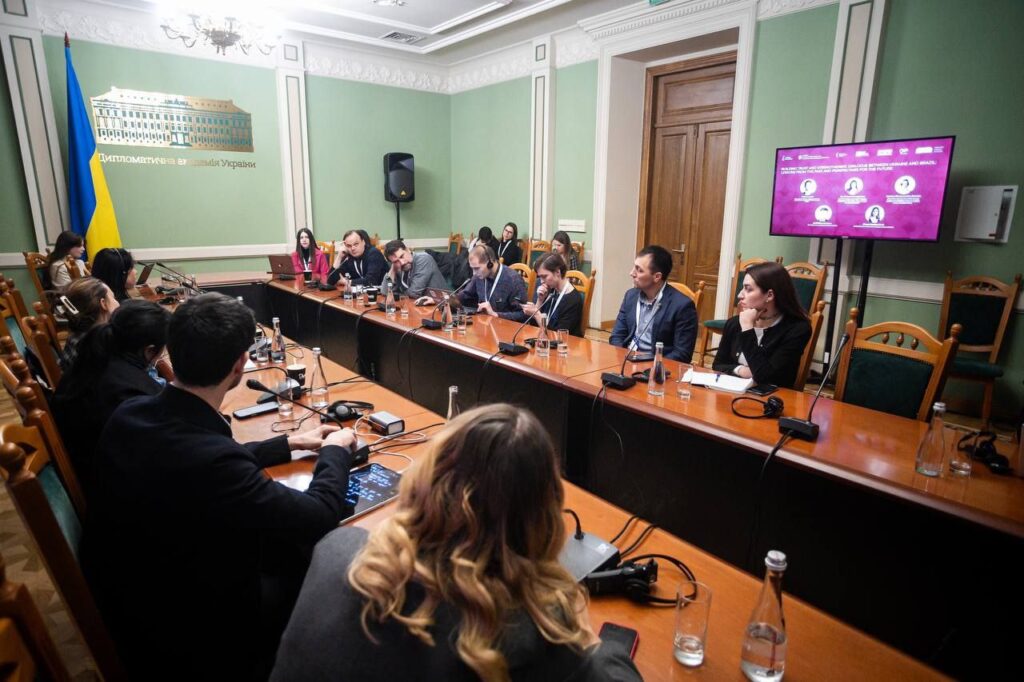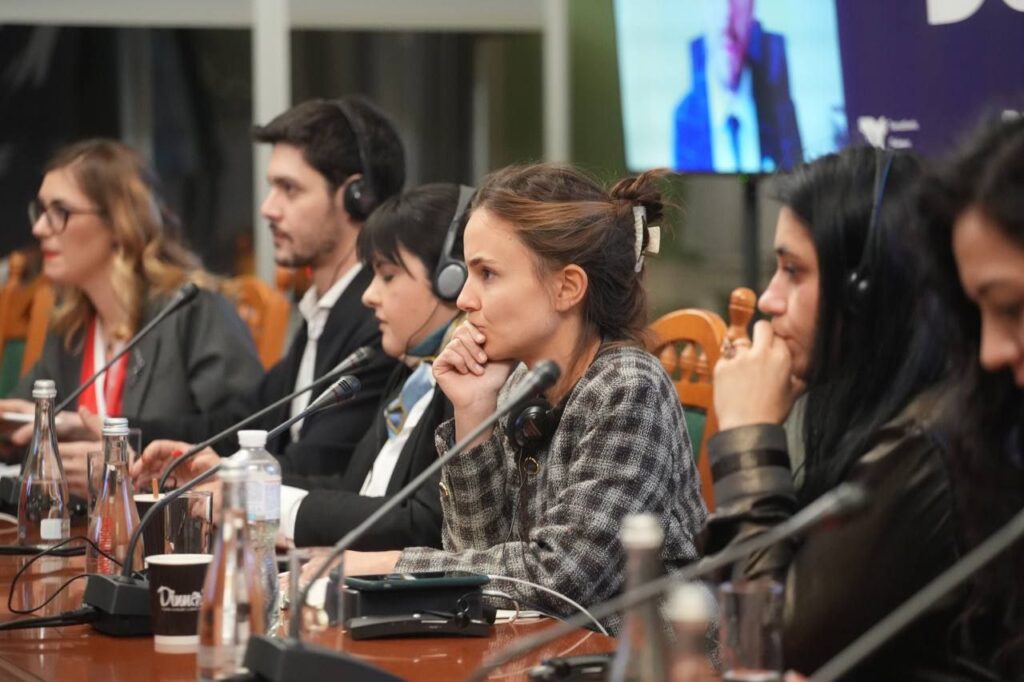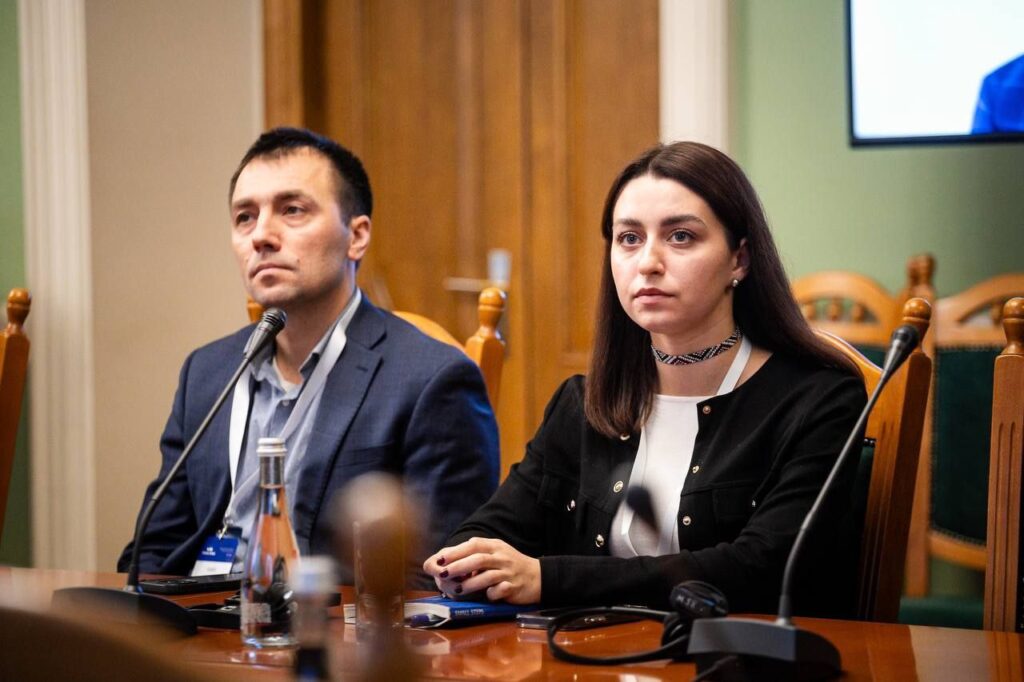Am 22. November fand die Veranstaltung “Vertrauen aufbauen und den Dialog zwischen der Ukraine und Brasilien stärken: Lehren aus der Vergangenheit und Perspektiven für die Zukunft“ im Rahmen der Zweiten Internationalen Konferenz „Krim Global. Die Ukraine durch den Süden verstehen“ statt. Die Veranstaltung wurde vom Transatlantischen Dialogzentrum organisiert. Die Sitzung wurde von Diana Maslianchuk, einer politischen Analystin (TDC), moderiert.
Die Teilnehmer der Diskussion:
– Uriã Fanchelli, internationaler politischer Analyst, Autor und politischer Kommentator bei CNN Portugal;
– Fernanda Magnotta, Koordinatorin des Programms für Internationale Beziehungen an der FAAP, Senior Researcher am CEBRI, Global Fellow am Wilson Center und Analystin bei CNN Brasilien;
– Marina Slhesarenko-Barreto, Forscherin im Bereich Recht und Demokratie am Brasilianischen Zentrum für Analyse und Planung (Cebrap) und politische Analystin;
– Andrii Borodenkov, Berater der Botschaft der Ukraine in Brasilien.

Während der Diskussion betonte Uriã Fanchelli, dass die Ukraine jedes Recht habe, für ihre Freiheit zu kämpfen, und dass imperialistische Eingriffe in ihre Unabhängigkeit inakzeptabel seien.
Andrii Borodenkov hob die Bewahrung der Sprache und Kultur der ukrainischen Gemeinschaft in Brasilien hervor, die gleichzeitig erfolgreich in die brasilianische Gesellschaft integriert wurde. Er merkte auch an, dass die offiziellen Beziehungen zwischen den beiden Ländern 1990 begannen, mit bedeutendem Potenzial für die Zusammenarbeit in den Bereichen Landwirtschaft, Energie und High-Tech-Industrien, das bisher jedoch nicht ausreichend genutzt wird.
Fernanda Magnotta wies darauf hin, dass die Außenpolitik Brasiliens von Pragmatismus und Partnerschaften mit verschiedenen Akteuren geprägt ist, was häufig dazu führt, dass seine Position zu internationalen Fragen, einschließlich der Ukraine, als ambivalent wahrgenommen wird. Dieser Ansatz wird als eine Strategie der Resilienz verstanden. Sie betonte auch, dass die Außenpolitik Brasiliens stark von den innenpolitischen Dynamiken beeinflusst wird.

Marina Slhesarenko-Barreto unterstrich die starken Digitalisierungsinitiativen der Ukraine und schlug vor, dass beide Länder von einem Austausch von Erfahrungen in diesem Bereich profitieren könnten. Sie betonte auch die Komplexität der brasilianischen Politik und wies auf die Unterscheidung zwischen institutionellen Politiken und den Perspektiven der Zivilgesellschaft hin.
Fernanda Magnotta fasste die Diskussion zusammen und nannte die wichtigsten Punkte für das Engagement der Ukraine in Brasilien. Sie schlug vor, dass die Ukraine gemeinsame demokratische Werte und ähnliche Erfahrungen mit politischen Krisen betonen könnte, wenn sie mit der aktuellen brasilianischen Regierung interagiert. Sie schloss mit der Feststellung, dass die Herausforderungen der Ukraine das Scheitern des globalen Sicherheitssystems verdeutlichen, das dem Land keinen ausreichenden Schutz bieten konnte.

Die Veranstaltung trug zu einem tieferen Verständnis der gemeinsamen Herausforderungen und Aussichten für die Zusammenarbeit zwischen der Ukraine und Brasilien bei.